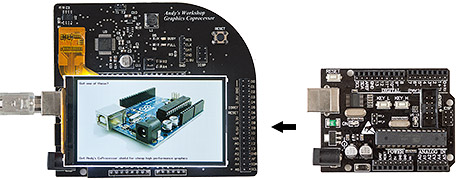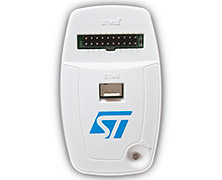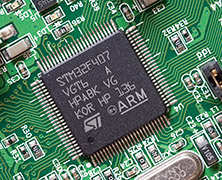In this article I’m going to show you how to do a straightforward modification to the STM32 F4 Discovery board that will change the onboard oscillator from 8MHz to 25MHz. Why do this Probably the main reason to do this is ethernet. If you’re prototyping an MII ethernet PHY then...
Modding the STM32 F4 Discovery with a 25MHz clock
posted by Andy
Arduino Uno R3 graphics accelerator shield uses no pins
posted by Andy
Hello and welcome to another in my series of unique hardware projects designed to bring you something useful that you’ve hopefully never seen before and at a price point that any hobbyist can afford. This project brings together the knowledge that I’ve gained over the last few years to bring you a graphics accelerator for the Arduino Uno R3 based on an ARM Cortex M0 core attached to a 640×360 LCD from the Sony U5 Vivaz cellphone. In previous articles you’ve seen how I’ve reverse engineered the Sony LCD and then used it in reflow oven and FPGA graphics accelerator projects. Introduction TFT LCD shields for the...
ST-Link v2. One programmer for all STM32 devices
posted by Andy
Over the last few years I’ve amassed quite a collection of STM32 development boards. Third party boards dominate my collection for the F1 series whilst I have official ST discovery boards for the F0, F4 and F1 Value Line. We’ve been lucky with the official ST discovery boards...
An FPGA sprite graphics accelerator with a 180MHz STM32F429 controller and 640 x 360 LCD
posted by Andy
A very warm welcome to my most ambitious project to date. In this project I’m going to attempt to design and build a sprite-based graphics accelerator that will function as a co-processor to an MCU. Using cheap off-the-shelf components I’m hoping to achieve a level of gaming performance that compares well to popular commercial hand-held gaming consoles. I’m hoping that I’ll learn a few new tricks along the way, and, if the ideas currently zinging around inside my head all land the right way up and in the right order then I should be able to write a demo or two, maybe even a small game as a proof of concept. Naturally...
stm32plus 3.2.0: Supporting the STM32F0 Cortex M0
posted by Andy
A few months ago I made the decision to start supporting the lower priced, hobbyist friendly STM32 devices in my stm32plus C++ library. These lower-end devices come in lower pin-count, smaller packages that are easier to work with and they have reduced clock speeds that make for fewer PCB...
stm32plus 3.1.1: Supporting the STM32 VL Discovery
posted by Andy
If you’ve been following the releases on my stm32plus github repo then you’ll already be aware that version 3.1.1 has been released. The main feature of this new release is support for the STM32 Medium Density Value Line devices, exemplified by the STM32 Value Line Discovery board...
stm32plus::net, a C++ TCP/IP stack for the STM32
posted by Andy
Welcome to a landmark release, version 3.0.0, of my stm32plus C++ library for the STM32F1 and STM32F4 series of microcontrollers. This release introduces support for the ethernet MAC peripheral in the form of an object-oriented TCP/IP stack as well as support for the STM32F107 connectivity...
stm32plus 2.1.0
posted by Andy
The latest release is now 3.0.0. Be sure to check out the announcement here. Due to the use of c++0x features the minimum compiler requirement is now version 4.7.0 of gcc stm32plus version 2.1.0 has now been released and is available from my downloads page. This article will...







